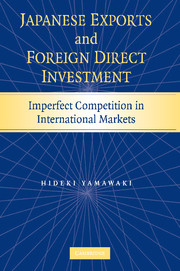Book contents
- Frontmatter
- Contents
- Tables
- Figures
- Preface
- 1 Introduction
- 2 Export Pricing Under Imperfect Competition
- 3 Export Price, Learning, and Domestic Demand Disturbances
- 4 Foreign Market Structure, Export Price, and Profitability
- 5 Competitive Advantage and Export Performance
- 6 Entry in the European and U.S. Manufacturing Industries
- 7 Strategic Interactions in Cross-Market Entry
- 8 Responses of Foreign Firms to Japanese Competition
- 9 Exit in the U.S. Manufacturing Industries
- 10 Interpreting the Empirical Findings
- 11 Implications
- Appendixes
- References
- Index
10 - Interpreting the Empirical Findings
Published online by Cambridge University Press: 08 January 2010
- Frontmatter
- Contents
- Tables
- Figures
- Preface
- 1 Introduction
- 2 Export Pricing Under Imperfect Competition
- 3 Export Price, Learning, and Domestic Demand Disturbances
- 4 Foreign Market Structure, Export Price, and Profitability
- 5 Competitive Advantage and Export Performance
- 6 Entry in the European and U.S. Manufacturing Industries
- 7 Strategic Interactions in Cross-Market Entry
- 8 Responses of Foreign Firms to Japanese Competition
- 9 Exit in the U.S. Manufacturing Industries
- 10 Interpreting the Empirical Findings
- 11 Implications
- Appendixes
- References
- Index
Summary
Major Findings
The first aim of this study is to explore how firms compete in international markets and examine empirically the ways in which interfirm rivalry affects international trade and investment. The second aim is to explore the evolution of the export and foreign direct investment behavior of Japanese firms in the period between the late 1950s and early 2000s. This study provides the first systematic account on the changing pattern of Japanese competitiveness in the international market. The central results of the statistical analysis pertain to the test of the hypothesis, which contends that Japanese firms' export and direct investment behaviors are influenced by market structure. The results, in many ways, are consistent with that hypothesis. Because the specific results are summarized in the concluding section of each chapter, only the major findings of this study are summarized below:
The export pricing behavior of Japanese industries differs by industry. Some of Japan's major export industries behaved as oligopolies in the international market during the 1970s and the 1980s. These industries are steel (plates and sheets), construction machinery, metal working machinery, radio and TV, photographic cameras, telecommunication equipment, tape and video recorders, audio equipment, and photographic films (Chapter 2).
[…]
- Type
- Chapter
- Information
- Japanese Exports and Foreign Direct InvestmentImperfect Competition in International Markets, pp. 178 - 198Publisher: Cambridge University PressPrint publication year: 2007



